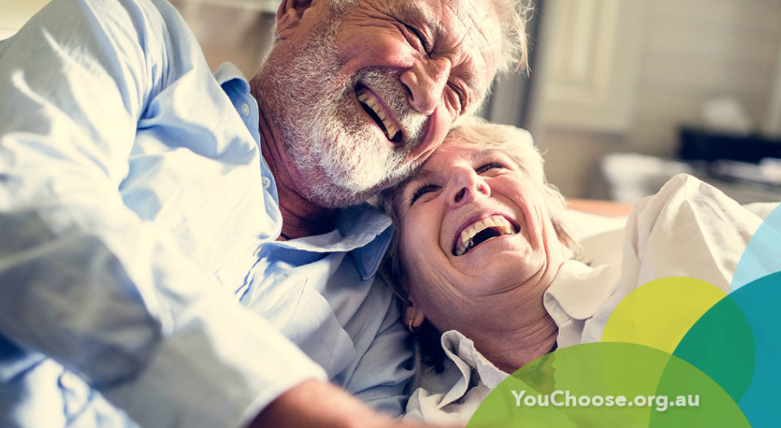Project Description

Stay connected, stay healthy through social contact
CLIENT: Be You Not Them
PUBLISHED: BaptistCare YouChoose website
ORIGINAL ARTICLE: Stay connected, stay healthy through social contact
CREATED: November 2018
AUTHOR: Fallon Dasey
Remaining socially connected takes a little extra work as we age. But aged care research shows keeping in touch with the community through clubs and other activities is closely linked to living a healthy and happy life. Kay Martens, a qualified Mental Health expert, and Regional Operations Manager for BaptistCare’s Home Services, explains more.
Imagine if your doctor offered you a new drug that could boost your mood and self-esteem. What’s more, it could improve your physical and emotional health and increase your chances of living a long life. Would you take it?
If you said ‘yes’, consider this. There is a way that many older people can achieve exactly these results without filling a single subscription. It’s called ‘getting out more’ and it has absolutely zero side effects.
Numerous studies show that increased social interaction – basically getting out and about more often – has a powerful effect on the physical and emotional health of older people. In a landmark research paper in 2005, Sue Malta from the National Ageing Research Institute concluded that, “Social connection appears to provide a protective effect against ill health and mortality in aged people. Socially connected adults have a greater chance of successfully recovering from a heart attack and have lower rates of coronary heart disease than socially isolated individuals. Social connection [also contributes] to seniors’ overall health and wellbeing.”
By contrast, Malta’s study found older people who don’t get enough social interaction risk a long list of potential physical and mental ailments. Socially isolated older Australians are likely to be more depressed and in poorer health than their socially connected counterparts.
Challenges to staying connected
So, if the evidence is so clear, why don’t all older Australians get adequate social contact?
Kay Martens, BaptistCare’s Regional Operations Manager for Home Services in NSW & ACT, says various factors are to blame. For one, as we grow older, we tend to leave behind the social networks we developed while working full time and raising families.
“Often people’s friends and loved ones may have passed on or moved away,” she says. “And they may not be seeing their family quite as often as before.”
A health episode might also cause an aged person to lose confidence about going out. “They might have had a fall and lost their mobility and confidence,” she says. “They might suddenly need to take the bus somewhere instead of walking and they worry about getting on the bus and finding a seat,” says Kay.
Once the habit of going out regularly is broken, it’s easy for people to decline mentally and physically. “People often withdraw and stay at home and develop unhealthy habits,” says Kay, who has a master’s degree in Mental Health. Isolated older people often eat poorly because they’re not sharing meals with others on a regular basis. This can have follow-on effects for their mental and physical health.
Social clubs can help
Kay says there are lots of ways older people who have found themselves socially isolated can break the cycle. Some of these involve help from Home Care packages. Home Care providers such as BaptistCare provide transport services that allow older people to attend events and activities they are interested in.
BaptistCare also provides welcoming social clubs in a range of NSW and ACT locations tailored to the needs and interests of older Australians. “Our social clubs are designed with older people in mind and they are safe,” says Kay. “You don’t need to walk a long way to go to the bathrooms and there are meals served, so you don’t need to worry about food.”
BaptistCare’s social clubs offer a wide range of activities. “You might get involved in exercise programs, or contribute to community groups through woodwork, knitting or crocheting. You’re with likeminded people, undertaking a meaningful activity and you have a sense of giving back to the community.”
Options for quieter people
Kay says getting out in the community doesn’t have to involve being with a group. More introverted individuals in aged care might enjoy sitting in a beautiful park. “We even have some gentlemen who like to go to the airport and people-watch and see the planes coming and going,” she says.
Kay says if people have been isolated for a while, increasing their social interaction may seem daunting at first. But help is available and the rewards are significant.
“You’ll be keeping your brain active by engaging or talking or focusing on an activity or an exercise,” she says. “This can potentially help you avoid other serious illnesses like dementia. You’ll also have a sense of belonging. You’re engaging with others and forming friendships and feeling like you’re forming a bond.”
YouChoose by BaptistCare offers people in aged care a range of services to help them to remain socially active and to maintain and develop friendships. To find out more, contact the BaptistCare Customer Engagement Centre on 1300 275 227 or visit www.youchoose.org.au.
Hear from Kay Martens, a qualified Mental Health expert, and Regional Operations Manager for BaptistCare’s Home Services.



